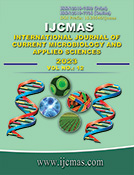


 National Academy of Agricultural Sciences (NAAS)
National Academy of Agricultural Sciences (NAAS)

|
PRINT ISSN : 2319-7692
Online ISSN : 2319-7706 Issues : 12 per year Publisher : Excellent Publishers Email : editorijcmas@gmail.com / submit@ijcmas.com Editor-in-chief: Dr.M.Prakash Index Copernicus ICV 2018: 95.39 NAAS RATING 2020: 5.38 |
The present investigation was carried out with 10 genotypes of Indian mustard for 11 quantitative traits to examine the genetic variability, heritability and genetic advance of per cent of mean at Field Experiment Centre, Department of Genetics and Plant Breeding, SHUATS, Prayagraj in Randomized Block Design with three replications during Rabi, 2021-22. Phenotypic Coefficient of Variation (PCV) was higher than Genotypic Coefficient of Variation (GCV) indicating that these characters are influenced by environment for all the traits. High estimates of PCV and GCV were observed for number of secondary branches/plant, biological yield/plant and number of siliqua/plant. High heritability was recorded for number of siliqua/plant, number of secondary branches/plant, biological yield/plant, number of seeds/siliqua, number of primary branches/plant, harvest index, seed yield/plant and high genetic advance as percentage of mean for number of secondary branches/plant, number of siliqua/plant, biological yield/plant, number of seeds/siliqua and harvest index. High heritability coupled with high genetic advance in percent of mean was observed for number of siliqua/plant, number of secondary branches/plant, biological yield/plant, number of seeds /siliqua, harvest index and number of primary branches/plant. High heritability coupled with high genetic advance indicated that most likely the heritability is due to additive gene effect and selection directly based on these traits would be effective.
 |
 |
 |
 |
 |